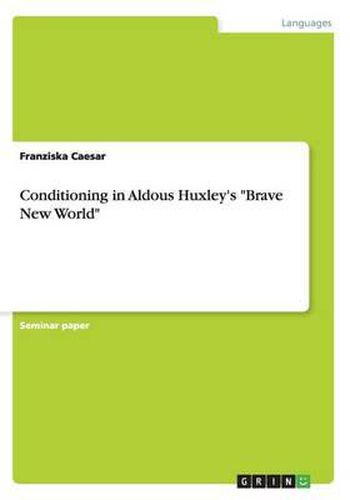Readings Newsletter
Become a Readings Member to make your shopping experience even easier.
Sign in or sign up for free!
You’re not far away from qualifying for FREE standard shipping within Australia
You’ve qualified for FREE standard shipping within Australia
The cart is loading…






Seminar paper from the year 2010 in the subject Literature - Basics, grade: 2,0, Catholic University Eichstatt-Ingolstadt (Sprach-und Literaturwissenschaften), language: English, abstract: Contents 1. Introduction …………………………………………………………………………………….03 2. The various forms of conditioning in Brave New World ………………………………04 2. 1 Biological engineering …………………………………………………………..04 2. 2 The use of psychological conditioning ……………………………………….05 2. 2. 1 Behaviourism ………………………………………………………………….05 2. 2. 2 Sleep-teaching and hypnopaedia …………………………………………..06 2. 3 Chemical persuasion……………………………………………………………….08 3. The essential role of conditioning in the utopian world ……………………………10 4. Conclusion …………………………………………………………………………………12 Bibliography …………………………………………………………………………………14 1. Introduction Unquestionably, Aldous Huxley’s Brave New World, written in 1931, is one of the most fascinating dystopian novels. His description of a world state in the future, in which people are conditioned and manipulated from the cradle to the grave is meant to be a warning of the danger of dehumanization. Huxley draws a picture of a future including the misuse of political power, economic control, sciences and technology, biological engineering, mass consumption and the loss of ethical values. More precisely, Huxley’s Brave New World could be regarded as a kind of leisure dystopia which is defined as an utopia [that has] gone wretched or failed paradise-engineering projects. The fine line between utopia and dystopia becomes visible. In leisure dystopian societies like in Brave New World, all problems have officially been abolished and the people are living in wealth and happiness. But this state is only achieved by eliminating intellectualism, values or individual freedom. Therefore, the state rulers need means of control. One of the most powerful tools is conditioning in various forms. This study is meant to focus on the three types of conditioning pr
$9.00 standard shipping within Australia
FREE standard shipping within Australia for orders over $100.00
Express & International shipping calculated at checkout
Seminar paper from the year 2010 in the subject Literature - Basics, grade: 2,0, Catholic University Eichstatt-Ingolstadt (Sprach-und Literaturwissenschaften), language: English, abstract: Contents 1. Introduction …………………………………………………………………………………….03 2. The various forms of conditioning in Brave New World ………………………………04 2. 1 Biological engineering …………………………………………………………..04 2. 2 The use of psychological conditioning ……………………………………….05 2. 2. 1 Behaviourism ………………………………………………………………….05 2. 2. 2 Sleep-teaching and hypnopaedia …………………………………………..06 2. 3 Chemical persuasion……………………………………………………………….08 3. The essential role of conditioning in the utopian world ……………………………10 4. Conclusion …………………………………………………………………………………12 Bibliography …………………………………………………………………………………14 1. Introduction Unquestionably, Aldous Huxley’s Brave New World, written in 1931, is one of the most fascinating dystopian novels. His description of a world state in the future, in which people are conditioned and manipulated from the cradle to the grave is meant to be a warning of the danger of dehumanization. Huxley draws a picture of a future including the misuse of political power, economic control, sciences and technology, biological engineering, mass consumption and the loss of ethical values. More precisely, Huxley’s Brave New World could be regarded as a kind of leisure dystopia which is defined as an utopia [that has] gone wretched or failed paradise-engineering projects. The fine line between utopia and dystopia becomes visible. In leisure dystopian societies like in Brave New World, all problems have officially been abolished and the people are living in wealth and happiness. But this state is only achieved by eliminating intellectualism, values or individual freedom. Therefore, the state rulers need means of control. One of the most powerful tools is conditioning in various forms. This study is meant to focus on the three types of conditioning pr